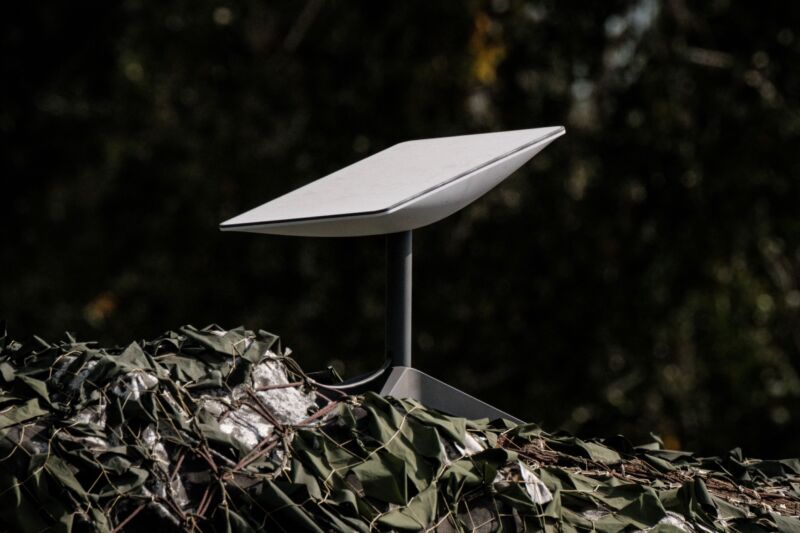JON BRODKIN

According to author Walter Isaacson, the report that Elon Musk disabled Starlink to thwart a Ukrainian submarine drone attack is incorrect. Musk did refuse to enable Starlink in the area near Crimea, however.
"To clarify on the Starlink issue: the Ukrainians THOUGHT coverage was enabled all the way to Crimea, but it was not," Isaacson wrote. "They asked Musk to enable it for their drone sub attack on the Russian fleet. Musk did not enable it, because he thought, probably correctly, that would cause a major war."
Musk weighed in, writing, "The onus is meaningfully different if I refused to act upon a request from Ukraine vs. made a deliberate change to Starlink to thwart Ukraine. At no point did I or anyone at SpaceX promise coverage over Crimea. Moreover, our terms of service clearly prohibit Starlink for offensive military action, as we are a civilian system, so they were again asking for something that was expressly prohibited."
Musk added that "SpaceX is building Starshield for the US government, which is similar to, but much smaller than Starlink, as it will not have to handle millions of users. That system will be owned and controlled by the US government."]
Original story: Elon Musk ordered SpaceX engineers to temporarily disable Starlink in order to thwart a Ukrainian submarine drone attack on the Russian naval fleet last year, according to a report based on a new biography of Musk. The book provides more details on a previously reported incident.
A CNN exclusive report today said, "Elon Musk secretly ordered his engineers to turn off his company's Starlink satellite communications network near the Crimean coast last year to disrupt a Ukrainian sneak attack on the Russian naval fleet, according to an excerpt adapted from Walter Isaacson's new biography of the eccentric billionaire titled 'Elon Musk.'"
"As Ukrainian submarine drones strapped with explosives approached the Russian fleet, they 'lost connectivity and washed ashore harmlessly,' Isaacson writes," the CNN report said. Ukrainian officials reportedly begged Musk to turn satellite service in the area back on.
It's said that Musk spoke with senior Russian officials and feared that Russia would respond with a nuclear attack. "Musk's decision, which left Ukrainian officials begging him to turn the satellites back on, was driven by an acute fear that Russia would respond to a Ukrainian attack on Crimea with nuclear weapons, a fear driven home by Musk's conversations with senior Russian officials, according to Isaacson," CNN wrote. Musk reportedly said he was worried about the situation becoming a "mini-Pearl Harbor."
Ukraine government official Mykhailo Fedorov reportedly "plead[ed] with Musk to restore connectivity for the submarine drones by telling Musk about their capabilities in a text message." Musk "replied that he was impressed with the design of the submarine drones but that he wouldn't turn satellite coverage back on for Crimea because Ukraine 'is now going too far and inviting strategic defeat,'" the report said.
As the dispute unfolded, "Musk was soon on the phone with President Joe Biden's national security adviser, Jake Sullivan, the chairman of the joint chiefs, Gen. Mark Milley, and the Russian ambassador to the US to address anxieties from Washington, DC, to Moscow, writes Isaacson," according to CNN.
“How am I in this war?” Musk asks
SpaceX President and COO Gwynne Shotwell confirmed in February that the company took steps to prevent Ukraine's military from using Starlink satellite Internet with drones.
"We were really pleased to be able to provide Ukraine connectivity and help them in their fight for freedom. It was never intended to be weaponized. However, Ukrainians have leveraged it in ways that were unintentional and not part of any agreement," Shotwell said at the time. Shotwell didn't provide details on how SpaceX disrupted Ukraine's use of Starlink but said, "there are things that we can do to limit their ability to do that... there are things that we can do and have done."
Musk wrote in a January 2023 tweet that "we are not allowing Starlink to be used for long-range drone strikes."
SpaceX came to Ukraine's aid when Russia invaded the country in February 2022. After the Russian invasion disrupted broadband service, Fedorov asked Musk to send Starlink terminals, and Musk quickly did so.
Within weeks, there were reports that Starlink connections helped the Ukraine military's elite drone unit target and destroy Russian tanks and other "priority targets." Starlink's terms of service say it is "not designed or intended for use with or in offensive or defensive weaponry or other comparable end-uses."
"How am I in this war?" Musk reportedly said to Isaacson during an interview for the book to be published on September 12. "Starlink was not meant to be involved in wars. It was so people can watch Netflix and chill and get online for school and do good peaceful things, not drone strikes."
In October 2022, Musk proposed a peace plan that would formally make Crimea part of Russia. The USSR transferred Crimea to Ukraine in 1954, but Russia has occupied the peninsula since 2014. Ukraine has stood firm in its demand that Russia withdraw from Crimea, while the Kremlin demands that Crimea be recognized as Russian territory.
No comments:
Post a Comment